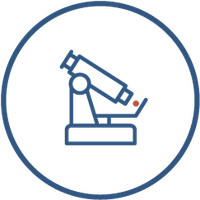Published: 24 January 2023
At BioAscent, we work with customers to deliver complex projects to accomplish their drug discovery goals. Projects are overseen by a dedicated project manager, and the project goals achieved not just through our extensive scientific and technical expertise, but also via careful planning and application of key project management processes.
In this blog, Dr Brian McFerran, Associate Director Biosciences and an experienced project manager, explains why project management is important, what makes a good project manager, and how project management is at the core of delivering customer projects at BioAscent.
Why is project management important?
Projects bring about change and with that uncertainty. This is particularly the case in the field of drug discovery, where projects are routinely focused on the delivery of unique drug candidates and the implementation of novel technologies. It’s therefore essential that a highly confident and capable project manager takes the lead and steers the project forward.
In simple terms, the project manager will aim to manage that uncertainty to the extent possible and ensure that a project is delivered within the agreed timelines, within budget and that deliverables are in line with the agreed acceptance criteria. To do so the project manager will rely on a range of processes, including:
Risk Management – A risk is an uncertain event which may occur in the future and should it occur will impact the project. Careful but efficient consideration of potential risks will minimise realisation of threats (negatives) but maximise the exploitation of opportunities (positives) to provide the best platform possible for project success.
Lessons learned - Despite our best efforts, risks may still materialise as an issue i.e. something that has happened and has impacted on the project. Of course, the priority is to address these issues, however it’s important to then reflect and consider lessons learned and potential continuous improvements that can be applied to the benefit of future projects.
Change management – Particularly in a research environment it is inevitable that projects will change during their lifetime with the potential to exceed their original time and cost estimates, as well as experience scope creep. It is essential to pro-actively manage this change by suggesting and discussing solutions to unforeseen problems, and documenting and communicating the resulting changes in scope or method once signed off by the customer. To an extent the budgetary impacts of this process are built into the FTE costing model used across drug discovery CROs. However, when required, we ensure that through the pro-active implementation of change orders, all stakeholders (both within BioAscent and the customer) will have up-to-date visibility of signed parameters and ensure that projects deliver within the agreed time and cost constraints and to the required quality but do so in the context of changing requirements.
What makes a good project manager?
A project manager will be exposed to all aspects of a business and as such require a wide range of skills including a knowledge of the PM processes outlined above, good business awareness and a high degree of technical understanding. But what sets a good project manager apart from an excellent project manager is their soft skills. These typically include:
Communication – This is by far the most important aspect of any project and a crucial soft skill any project manager needs to have. Possessing the ability to effectively communicate information to the wider scientific team (both our customers, and internally within BioAscent) is paramount.
Time management – A well-defined project plan sits at the very heart of a project and by extension, the project manager. The management of time for a project falls squarely upon the project manager’s shoulders, for it is their responsibility to ensure that they and the wider team work together to deliver the proposed project on time.
Leadership – Projects are finite, and each will require team building and leadership. The project manager needs to accelerate the team from the ‘forming’ to the ‘performing’ stages of development as soon as possible. By empowering the team, the project manager and their team will succeed in their efficiency and results.
Critical thinking and problem solving – No two projects are the same and there is always something new to learn. A good project manager is not afraid of tackling an issue, standing their ground, or highlighting areas for change.
Adaptability – When situated in a client-facing environment, a good project manager will know and understand that no two organisations are the same and that they will need to take the time to understand the client, their priorities and processes.
At BioAscent our project managers have many years of experience in a relevant scientific background. As such they are able to oversee all aspects of a project from initial scoping discussions to technical execution to the final deliverables. They also work with the extended BioAscent team and any external partners, pulling together the required expertise from chemistry, biosciences, compound management, DMPK and other disciplines as required, and act as the on-site advocate for our customers.
The best projects are those that are truly collaborative, and we consider ourselves as an extension of our customer, adopting a “one team” approach. Open and honest communication is key to everything we do and at BioAscent we focus on building relationships with clients that last many years, with the project manager as a constant and at the heart of that relationship.




